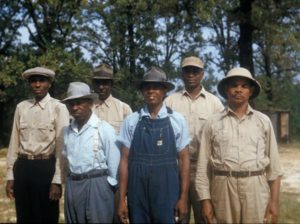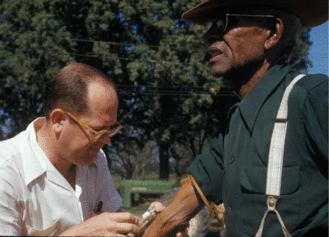
Participants in the Tuskegee Study of Untreated Syphilis in the Negro Male. National Archives.
The lasting mistrust caused by the Tuskegee syphilis experiment may have had far reaching implications for Black men in the South, a new study suggests.
For the 1932 study, the U.S. Public Health Service enlisted Tuskegee University in Alabama to recruit 600 Black men, 399 with syphilis and 201 without, to examine the long-term effects of untreated syphilis. The group of poor sharecroppers were never informed of the true purpose of the study, and instead were told they’d be given free healthcare, meals and burial insurance. Doctors denied them medical treatment long after penicillin was introduced as the drug of choice for the disease in the late 1940s.
The unethical study reached the national stage in 1972, when multiple news outlets reported the details of the decades-long experiment. The ensuing public outrage put an end to the study in November of that year and inspired a class-action lawsuit filed on behalf of the participants.
According to an analysis by the National Bureau of Economic Research, widespread reporting of the clinical experiment can be directly linked to the decline in Black men’s health after 1972. Authors Marcella Alsan, an assistant professor of medicine at Stanford, and Marianne Wanamaker, economics professor at the University of Tennessee, argue Black men stopped seeking medical care and their overall health suffered greatly as a result.
“We find that the historical disclosure of the study in 1972 is correlated with increases in medical mistrust and mortality and decreases in both outpatient and inpatient physician interactions for older black men,” the paper read.
Using data collected by the General Social Survey on mistrust of physicians, health care usage by the National Health Interview Survey and the Centers for Disease Control and Prevention mortality rates, the researchers theorized life expectancy at age 45 fell by 1.4 years for Black men, accounting for an estimated 35 percent of the 1980 life expectancy gap between Black and white men.
The scientists specifically targeted older Black males between the ages of 45 and 74 because, they contend, women and younger men of any race are more likely to seek urgent medical attention for severe complications such as childbirth, while older subjects are better able to evade care for chronic conditions. The study also took into account the African-American males’ proximity to the Tuskegee Institute in Macon County, Alabama, and found those living closer to the area faced greater impact.
The working paper, published online by NBER last week, has not been peer reviewed.
Experts have come forward to criticize what they believe is an over emphasis on one incident as the catalyst for Black Americans’ general mistrust of the American medical system.
“I think that this study makes it look like the reason for mistrust happened a long time ago,” Susan Reverby, Wellesley College professor and eminent expert on the Tuskegee study told The New York Times. “But in cases like this, the use of the term ‘Tuskegee’ is often raised as a metaphor for structural racism. That is what is at issue, not the Tuskegee study itself.”
“There have been tales circulating in Black communities since we got to this continent about the dangers that one ran in the presence of physicians,” said Robert Fullilove, associate dean at Columbia University’s School of Public Health, per StatNews.


